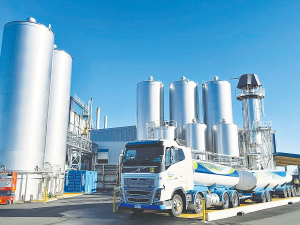Two new awards open to help young farmers progress to farm ownership
Entries have opened for two awards in the New Zealand Dairy Industry Awards (NZDIA) programme, aimed at helping young farmers progress to farm ownership.
 Fonterra has invested $40 million at its Tirau site to help concentrate whey permeate, making it more efficient to transport to its other sites to produce lactose.
Fonterra has invested $40 million at its Tirau site to help concentrate whey permeate, making it more efficient to transport to its other sites to produce lactose.
Fonterra is eyeing an increase in lactose production.
The co-operative has just invested $40 million in a move to help concentrate whey permeate at its Tirau site to make it more efficient to transport to other sites to produce lactose.
It’s a move the co-operative says is a positive step forward, creating better value return than the ethanol produced previously at the Tirau site.
During the dairy season’s peak, the plant produces up to 2 million litres of milk each day.
According to Fonterra general manager Central North Island Tony Maclean, 2.5 million litres of ethanol is also potentially stored there, meaning the plant is designated as a major hazard facility.
Maclean says that when the Tirau plant was built, there were benefits to converting lactose into ethanol.
“When the plant was built, the benefit of generating ethanol was primarily… set up reduce the amount of lactose that went to a wastewater treatment plant,” he told Dairy News.
Maclean says that at that time, harvesting the lactose as ethanol was seen as better than sending it on to wastewater treatment ponds.
He says that now, however, lactose produces more earnings for the cooperative than ethanol.
“Ethanol has limited usage. I mean, they made industrial grade ethanol there which was made for things like solvents and sanitisers where lactose can be used in a whole raft of pharmaceutical applications.
“The profitability from lactose as a product was greater than ethanol was.”
Maclean says the investment also means a lot for the co-operative in terms of its sustainability goals.
“We have a massive energy production per year,” Maclean told Dairy News, adding that energy production totalled 15,000 megajoules per year.
He says the move away from ethanol production towards lactose production will see reductions in CO2, water usage, wastewater and general waste. “So, it’s some pretty impressive numbers around those reductions.”
Maclean says there’s great value for money in the move as well.
“If you look at spending our shareholders’ money on remediating an asset to be compliant, around making that redundant and investing money into a brand new asset, with a slightly different product mix… the savings from that as well as the ability to generate lactose, we have the ability to reduce energy, reduce carbon, reduce water, reduce wastewater and waste,” he says.
Agriculture and Forestry Minister Todd McClay is encouraging farmers and growers to stay up to date with weather warnings and seek support should they need it.
The closure of SH2 Waioweka Gorge could result in significant delays and additional costs for freight customers around the Upper North Island, says Transporting New Zealand.
OPINION: The year has started positively for New Zealand dairy farmers and things are likely to get better.
Ministry for Primary Industries (MPI) Director General Ray Smith believes there is potential for an increase in dairy farming in New Zealand.
New Zealand's new Special Agricultural Trade Envoy, Horowhenua dairy farmer, company director and former Minister of Agriculture, Nathan Guy says the Free Trade Agreement (FTA) with India is a good deal for the country.
New figures show dairy farmers are not only holding on to their international workforce, but are also supporting those staff to step into higher-skilled roles on farm.